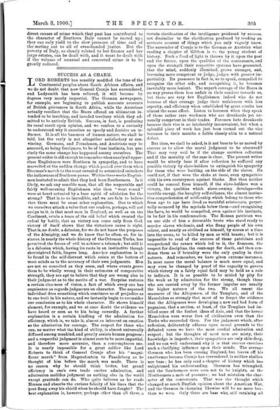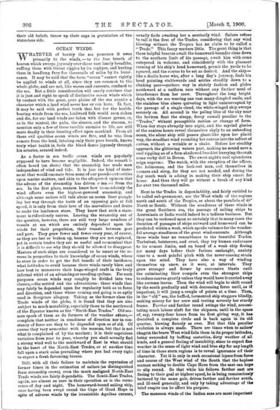SUCCESS AS A CHARM.
LORD ROBERTS has sensibly modified the tone of the Continental peoples about South African affairs, and we do not doubt that now General Cronje has surrendered, and Ladysmith has been relieved, it will become by degrees very nearly impartial. The German newspapers, fur example, are beginning to publish accurate accounts of British grievances in South Africa, while the Austrians actually recollect that the Boers offered an ultimatum in- tended to be insulting, and invaded territory which they ad- mitted to be entirely British. Success, in fact, is producing its usual result upon opinion, and we confess to a curiosity to understand why it exercises so speedy and decisive an in- fluence. It is all the baseness of human nature, we shall be told, but the reply is not altogether satisfactory or con- vincing. Germans, and Frenchmen, and Austrians may be assumed, as being foreigners, to be of base instincts, but pre- cisely the same change has happened among ourselves. The present writer is old enough to remember when nearly all upper- class Englishmen were Southern in sympathy, and to have marvelled at the sudden change which passed over them when Shermatt's march to the coast revealed to astonished onlookers the hollowness of Southern power. Within three weeks English- men hesitated to admit that they had been Southerners. Is it likely, we ask any sensible man, that all the respectable and fairly well-meaning Englishmen who then 'went round" were at heart actuated by a base spirit of adulation for the strong ? That is to us incredible, and we are fain to believe that there must be some other explanation. One to which we ourselves attach a value that our readers, perhaps, will not assign to it. is that most men in England, as well as on the Continent, retain a trace of the old belief which created the ordeal by battle, that as victory can come only from God, victory of itself shows that the victorious cause is right. That is, no doubt, a delusion, for we do not know the purposes of the Almighty, and we do know that he often, as, for in. stance, in nearly the whole history of the Ottoman Turks, has permitted the forces of evil to achieve a triumph ; but still it is a delusion which, having its roots in an instinctive though shortsighted faith, lingers long. Another explanation is to be found in the self-distrust which exists at the bottom of most minds as to the accuracy of their own judgments. Men are not so conceited as they seem, and where events .prove them to be wholly wrong in their estimates of comparative strength, they are apt to believe that they are wrong also in their judgment as to the merits of a war. Surprise restores a certain clearness of vision, a fact of which every one has cognisance as regards judgments on character. The aspersed individual does something which convinces us of prejudice as to one trait in his nature, and we instantly begin to reconsider our conclusion as to his whole character. He shows himself element, for example, and we at once doubt the evidence we have .heard or seen as to his being cowardly. A farther explanation is a certain kindling of the admiration for efficiency, which is, we take it, almost as inherent an emotion as the admiration for courage. The respect for those who can, no matter what the kind of ability, is almost universally diffused among mankind, and greatly assists human progress; and a respectful judgment is almost sure to be more impartial, and therefore more accurate, than a contemptuous one. It is nearly impossible for a great soldier like Lord Roberts to think of General Cronje after his "magni- ficent march" from Magersfontein to Paardeberg as he thought of him before the march was made. There is n6 reason why he should think better, but grand efficiency in one's own trade excites admiration, and admiration mollifies judgment as nothing else in the world except gratitude can do. Who quite believes as he reads Horace and absorbs the curious felicity of his lines that the 'poet flung away his shield when he should have fought? The best explanation is, however, perhaps other than all these, a
certain clarification of the intelligence produced by success, not dissimilar to the clarification produced by reading an accurate account of things which you only vaguely knew. The surrender of Cronje is to the German or Austrian what reading a chapter of Gibbon is to the young student of history. Such a flood of light is thrown by it upon the past and the future, upon the qualities of the contestants, and upon the strength their respective systems have generated, that the mind, suddenly illumined, grows stronger, and, becoming more competent to judge, judges with greater im- partiality. Its possessor in fact is, so to speak, compelled to recognise the other side, and recognising it, he becomes inevitably more lenient. The superb courage of the Boers in no way proves them less unfair in their conduct towards us, but there are very few Englishmen indeed who do not because of that courage judge their unfairness with less asperity, and efficiency when established by great results has almost the same effect. Listen to foremen when they speak of those rather rare workmen who are drunkards yet un- usually competent in their trades. Foremen hate drunkards because their vice is so intolerably inconvenient, but when a splendid piece of work has just been turned out the vice becomes in their months a foible closely akin to a natural defect.
Bat then, we shall be asked, is it not base to be so moved by success as to allow the moral judgment to be obscured ? That may very well be if the change survives reflection and if the morality of the case is clear. The present writer would be utterly base if after reflection he suffered any possible victory by slave-holders to extinguish hia sympathy for those who were battling on the side of the slaves. He could not, if that were the stake at issue, even sympathise with his own countrymen against blacks. But then neither could he conceal from himself, if the slave-holders won a victory, the qualities which slave-owning develops—the terrible energy, the haughty self-reliance, the almost instinc- tive comprehension of soldiership which belong to those who from age to age have lived as watchful aristocrats, perpet- ually menaced by the myriads below them—and recognising the facts, he would be compelled, even against his instincts, to be fair in his condemnation. The Roman patrician was on one side of him a detestable brute who stood ready to murder slaves wholesale, and who flung people of his own colour, and nearly as civilised as himself, by scores at a time into the arena, to be killed by Men or wild beasts ; but it is impossible to read of the success of those patricians and• comprehend the causes which led to it, the firmness, the respect for discipline, the contempt for death, and then con- demn them as if brutality were the only quality in their natures. And remember, we have given extreme instances. In most cases the moral balance is much more equal, and may even be changed by proof of the capacity to govern which victory on a fairly equal field may be held as a rule to indicate. It is as possible to be misled by pity for the weak as by admiration for the strong, though those who are carried away by the former impulse are usually the higher natures of the two. We all resent the massacre of the Albigenses, of the Templars, and of the Mamelnkea so strongly that most of us forget the evidence that the Albigenses were developing a new and bad form of paganism, that a section, at least, of the Templars had im- bibed some of the foulest ideas of Asia, and that the heroic Mamelnkes were worse foes of civilisation even than the Turks who succeeded them. For the judgment which, after reflection, deliberately adheres upon moral grounds to the- defeated cause we have the most cordial admiration and respect ; but the thoughts of most men are misty, their knowledge is imperfect, their sympathies are only skin-deep, and we can well understand why it is that success exercises such a clarifying influence upon their minds. The average German who has been cursing England, but leaves off his anathemas because Cronje has surrendered, is neither shallow nor base ; he has only read a chapter of history which has enlightened his understanding. Sherman has triumphed, and the Southerners were seen not to be knights, or the Northerners a mob of peasants ; we had mistaken the char- acter of the contestants. That was the thought which changed so much English opinion about the American War, and the German in changing likewise will be no more basa than we were. Only those are base who, still retaining all
their old beliefs, throw up their caps in gratulation of the victorious side.







































 Previous page
Previous page